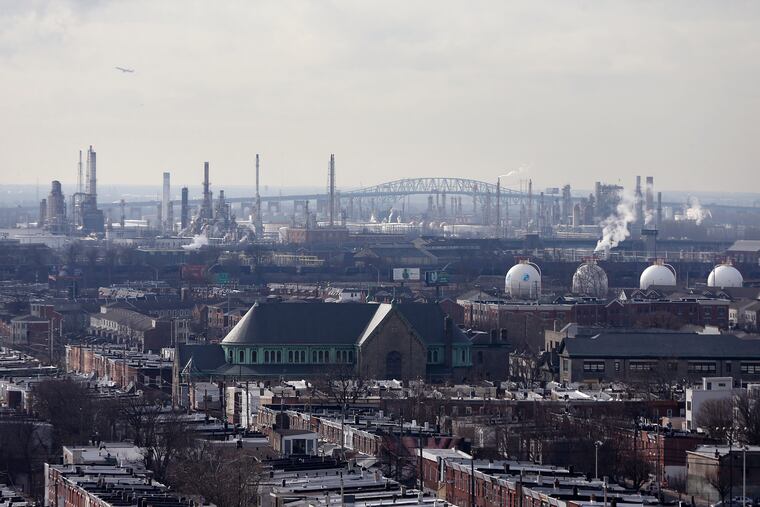6 things to know about the future of the South Philly refinery site
After months of uncertainty following a massive explosion and subsequent bankruptcy, the site of the shuttered South Philadelphia refinery complex is getting a new life.

After months of uncertainty following a massive explosion and subsequent bankruptcy, the site of the shuttered South Philadelphia refinery complex has new life and new ownership under a Chicago-based developer, expected to become official Thursday. And, for the first time since the 1860s, the area may not be used for refining oil.
Here’s a primer on the past and future of the fire-ravaged Philadelphia Energy Solutions complex, which once served as the East Coast’s largest oil refinery.
The refinery property is larger than all of Center City.
The 1,300-acre property — Philadelphia’s largest available commercial real estate parcel — actually consists of two refineries previously acquired by Sunoco: one in Point Breeze and another, larger refinery at Girard Point. With easy access to the Schuylkill River, railroads, and roadways, the site has been used for petroleum refining for more than 150 years. The announcement of its sale raised hopes among urban planners, environmentalists, and the refinery’s neighbors that a new, cleaner use can be found for a large property at Philadelphia’s southern gateway.
A Chicago-based real estate firm will redevelop the site.
Though more than a dozen companies initially lobbied for the refinery’s land, the expected winning proposal was submitted by Chicago-based Hilco Redevelopment Partners. Hilco’s $252 million bid promised “billions of dollars of investment into the site to transform the debtors’ business from a destroyed refinery complex to a mixed-use industrial site.”
» READ MORE: ‘Their timeline is aggressive’: Hilco plans to clean up polluted South Philly refinery site, city says
Hilco, which has vowed to move quickly to clean up the heavily-contaminated site, beat out an aggressive effort by retired PES chief executive Philip Rinaldi and a California-based development group to buy and restart the bankrupt refinery.
Unsecured creditors also fought Hilco’s plan in court, saying they are likely to receive only a small portion of the more than $1 billion they are owed while the refinery’s executives reap “bogus” bonuses.
» READ MORE: Bankrupt Philly refinery seeks millions more for executive bonuses ahead of potential sale
The refinery shut down following a June 2019 fire and declared bankruptcy in July.
In the early morning hours of June 21, 2019, a flammable-liquid leak triggered a fire at the refinery, leading to three successive explosions. The largest explosion, whose heat was detected by satellites in space, shook South Philly and launched pieces of a fuel tank — some as as large as trucks — careening across the complex.
» READ MORE: Blocks away from South Philly refinery explosion, residents saw what looked ‘almost like a nuclear disaster’
The blast released about 5,239 pounds of deadly chemicals — including 3,271 pounds of hydrofluoric acid — into the air. If contacted, hydrofluoric acid can cause destruction to deep tissue layers and bone. If inhaled, it can cause severe lung injury resulting in death.
» READ MORE: In Philly, a history of oil refinery fires going back decades
Five workers experienced minor injuries in the inferno, but the already-struggling refinery complex took an unrecoverable hit. A month after the explosion, PES declared Chapter 11 bankruptcy.
This is the second time the refinery has filed for bankruptcy in two years.
Going through three owners since 2012, the PES refinery has a struggled financially for years. It first filed for bankruptcy in January 2018.
PES was formed in 2012 by Carlyle Group and Sunoco Inc. to rescue the facility. But, led by banks that were former creditors, the refinery slumped under heavy debt as cash reserves dwindled and the company scrambled to conserve resources.
PES is the fourth Philly-area refinery to shut down in the last 10 years.
Only three refineries remain near Philadelphia: PBF Energy Inc. plants in Paulsboro, Gloucester County, and Delaware City, Del., and the Monroe Energy Refinery owned by Delta Air Lines in Trainer, Delaware County.
The sale to Hilco could still face legal challenges.
Just days before the refinery exploded in June, ICBC Standard Bank PLC lent PES millions of dollars to purchase petroleum. Now, the bank is engaged in a bitter struggle with other lenders over its rights to the refinery’s unpaid insurance claims.
That litigation is expected to take a long time to settle.
Staff writer Andrew Maykuth contributed to this article.